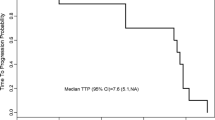Summary
Background Both MET and c-SRC are important mediators of cancer progression and there is cross talk between the two molecules. Preclinical studies have demonstrated combination of MET and c-SRC inhibitors is effective in multiple cancer types. Methods We analyzed the safety and efficacy of administering a c-SRC inhibitor (dasatinib) in combination with a MET inhibitor (crizotinib) in a two-arm concurrent phase I study. Arm A consisted of crizotinib fixed at 250 mg twice per day with escalation of dasatinib. Arm B consisted of dasatinib fixed at 140 mg daily with escalation of crizotinib. Endpoints included dose-limiting toxicities (DLTs), recommended phase II dose (RP2D), and response (RECIST 1.1). Results We enrolled 61 patients (arm A: 31, arm B: 30). The most common cancers were sarcoma (21%) and prostate cancer (16%). In Arm A, at dose level 2 (DL2), 40% (2/5) experienced DLTs. In the expanded DL1, 21% (4/19) experienced DLTs (all grade 3). In Arm B, at DL2, 50% (2/4) experienced DLTs. In the expanded DL1, 22% (4/18) experienced DLTs (all grade 3). RP2D was determined to be arm A, DL1 (250 mg crizotinib orally twice per day plus 50 mg dasatinib orally daily). Partial response (N = 1) and stable disease for ≥6 months (N = 3) were seen. Conclusions The combination of crizotinib and dasatinib is safe to administer but tolerability is limited given the high rate of adverse events. Responses and durable stable disease were limited. Further precision therapy approach using this specific combination may be difficult given the toxicity.

Similar content being viewed by others
References
Gherardi E, Birchmeier W, Birchmeier C, Vande WG (2012) Targeting MET in cancer: rationale and progress. Nat Rev Cancer 12(2):89–103. https://doi.org/10.1038/nrc3205
Engelman JA, Zejnullahu K, Mitsudomi T, Song Y, Hyland C, Park JO et al (2007) MET amplification leads to gefitinib resistance in lung cancer by activating ERBB3 signaling. Science 316(5827):1039–1043. https://doi.org/10.1126/science.1141478
Pietrantonio F, Oddo D, Gloghini A, Valtorta E, Berenato R, Barault L et al (2016) MET-driven resistance to dual EGFR and BRAF blockade may be overcome by switching from EGFR to MET inhibition in BRAF-mutated colorectal cancer. Cancer Discov 6(9):963–971. https://doi.org/10.1158/2159-8290.CD-16-0297
Straussman R, Morikawa T, Shee K, Barzily-Rokni M, Qian ZR, Du J et al (2012) Tumour micro-environment elicits innate resistance to RAF inhibitors through HGF secretion. Nature 487(7408):500–504. https://doi.org/10.1038/nature11183
Garajova I, Giovannetti E, Biasco G, Peters GJ (2015) c-Met as a target for personalized therapy. Transl Oncogenomics 7(Suppl 1):13–31. https://doi.org/10.4137/TOG.S30534
Blumenschein GR Jr, Mills GB, Gonzalez-Angulo AM (2012) Targeting the hepatocyte growth factor-cMET axis in cancer therapy. J Clin Oncol 30(26):3287–3296. https://doi.org/10.1200/JCO.2011.40.3774
Spigel DR, Edelman MJ, O'Byrne K, Paz-Ares L, Shames DS, Yu W et al (2014) Onartuzumab plus erlotinib versus erlotinib in previously treated stage IIIb or IV NSCLC: results from the pivotal phase III randomized, multicenter, placebo-controlled METLung (OAM4971g) global trial. J Clin Oncol 32:8000
Singhal E, Sen P (2011) Hepatocyte growth factor-induced c-Src-phosphatidylinositol 3-kinase-AKT-mammalian target of rapamycin pathway inhibits dendritic cell activation by blocking IkappaB kinase activity. Int J Biochem Cell Biol 43(8):1134–1146. https://doi.org/10.1016/j.biocel.2011.04.006
Sen B, Peng S, Saigal B, Williams MD, Johnson FM (2011) Distinct interactions between c-Src and c-Met in mediating resistance to c-Src inhibition in head and neck cancer. Clin Cancer Res 17(3):514–524. https://doi.org/10.1158/1078-0432.CCR-10-1617
Nehoff H, Parayath NN, McConnell MJ, Taurin S, Greish K (2015) A combination of tyrosine kinase inhibitors, crizotinib and dasatinib for the treatment of glioblastoma multiforme. Oncotarget 6(35):37948–37964. https://doi.org/10.18632/oncotarget.5698
Eisenhauer EA, Therasse P, Bogaerts J, Schwartz LH, Sargent D, Ford R et al (2009) New response evaluation criteria in solid tumours: revised RECIST guideline (version 1.1). Eur J Cancer 45(2):228–247. https://doi.org/10.1016/j.ejca.2008.10.026
Liu S, Nikanjam M, Kurzrock R (2016) Dosing de novo combinations of two targeted drugs: towards a customized precision medicine approach to advanced cancers. Oncotarget 7(10):11310–11320. https://doi.org/10.18632/oncotarget.7023
Bantscheff M, Eberhard D, Abraham Y, Bastuck S, Boesche M, Hobson S et al (2007) Quantitative chemical proteomics reveals mechanisms of action of clinical ABL kinase inhibitors. Nat Biotechnol 25(9):1035–1044. https://doi.org/10.1038/nbt1328
Peng S, Sen B, Mazumdar T, Byers LA, Diao L, Wang J et al (2016) Dasatinib induces DNA damage and activates DNA repair pathways leading to senescence in non-small cell lung cancer cell lines with kinase-inactivating BRAF mutations. Oncotarget 7(1):565–579. https://doi.org/10.18632/oncotarget.6376
Sen B, Peng S, Tang X, Erickson HS, Galindo H, Mazumdar T et al (2012) Kinase-impaired BRAF mutations in lung cancer confer sensitivity to dasatinib. Sci Transl Med 4(136):136ra70. https://doi.org/10.1126/scitranslmed.3003513
Schwaederle M, Zhao M, Lee JJ, Lazar V, Leyland-Jones B, Schilsky RL et al (2016) Association of biomarker-based treatment strategies with response rates and progression-free survival in refractory malignant neoplasms: a meta-analysis. JAMA Oncol 2(11):1452–1459. https://doi.org/10.1001/jamaoncol.2016.2129
Acknowledgments
We thank Erica Goodoff from Department of Scientific Publications, The University of Texas MD Anderson Cancer Center, Houston, TX for reviewing the manuscript.
Funding
Funded by University of Texas MD Anderson Cancer, P30 Cancer Center Support Grant (P30CA016672).
Author information
Authors and Affiliations
Corresponding author
Ethics declarations
Conflict of interest
The authors have no conflicts of interest to report.
Ethical approval
All procedures performed in studies involving human participants were in accordance with the ethical standards of the institutional committee and with the 1964 Helsinki declaration and its later amendments or comparable ethical standards.
Informed consent
Informed consent was obtained from all individual participants included in the study.
Electronic supplementary material
Supplementary Table 1
(DOCX 28 kb)
Supplementary Table 2
(DOCX 28 kb)
Rights and permissions
About this article
Cite this article
Kato, S., Jardim, D.L., Johnson, F.M. et al. Phase I study of the combination of crizotinib (as a MET inhibitor) and dasatinib (as a c-SRC inhibitor) in patients with advanced cancer. Invest New Drugs 36, 416–423 (2018). https://doi.org/10.1007/s10637-017-0513-5
Received:
Accepted:
Published:
Issue Date:
DOI: https://doi.org/10.1007/s10637-017-0513-5




